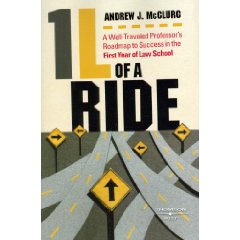Dec 16 2009
Following In Our Footsteps [or: Why Starting Your Own Firm Is Not All Glitz & Glamour]
Having recently started my own law firm, today I rode to a program in Raleigh sponsored by the NC Bar Association called Start Up Boot Camp. The seminar featured a series of speakers on topics related to starting one’s own small/solo law firm. Topics ranged from malpractice to fee setting to blogging to ethics.
On the way there, my colleague and fellow Elon Law grad (who also started her own firm) told me that she’d heard a rumor about Elon Law students. “A rumor at Elon!?” I exclaimed. “Surely not.” Indeed, she’d heard a rumor that certain members of the Class of 2010, having seen the blazing success of their predecessors in starting solo law practices, had stopped seeking jobs and intended to follow in the footsteps of so much of the Charter Class.
My friend and I are equally aghast at this idea. Oh, kids. Take heed: starting one’s own law firm is NOT all glitz and glamour!
If starting your own law firm is something you’ve contemplated a long time and have always wanted to do, then ignore this blog by all means. You’re all excited and I encourage you to follow your ambitions!
However, if you’re like so many who came before you and started out on your own simply because there wasn’t anything else, I still won’t discourage you, but CONSIDER THE FOLLOWING:
1. It takes money. A lot of law students come from money or at least have someone to pay their bills until they make money. Be sure you fall in one of those categories before you attempt this feat. Or be sure you have a nice line of credit. Starting a law practice is NOT CHEAP, even for the frugal among us. Space, equipment, filing fees, software, insurance, and advertising are all things you need and all things that have you bleeding money before you’ve made any. And bleed money you certainly will. If the sight of monetary blood leaves you queasy, consider sending more resumes and fewer PLLC filing fees!
2. It takes time. I am blessed with independent contract work to supplement my meager law firm income. However, every hour I spend earning $15/hr to pay my bills is an hour I’m not working on a firm that will potentially make me $150/hr. And every hour I spend building my firm (for free) is an hour I’m not billing as a contractor. Every hour I spend at seminars telling me how to do what I need to know how to do is an hour I make NO money. It’s a delicate balance and I spent the vast majority of the first month working 80+ hours per week. If you’re not ready, able, or willing to do that (consider your children and spouse before committing), then DON’T.
3. It takes skill you don’t have. Unless you were extraordinarily fortunate in your summer internships, and perhaps even then, you can bet that 95% of the issues crossing your desk will BAFFLE you. Seriously. Even stuff you just studied for the Bar will send you scurrying to friends and colleagues for the simplest advice. Law school teaches you how to think like a lawyer. It does NOT teach you how to BE a lawyer. It does not teach you what a “shuck” is or what to do with one or where to find one. It does not teach you what the plea options are for felony possession. It does not teach you what to charge your clients or what type of fee arrangement to make. It does not teach you how to navigate the courthouse or file your own claim (sans paralegal) or balance your office accounts or certify your IOLTA or create invoices or…. Well, you get the point. You will be lost all the time. Trust me. If fear frightens you, don’t start a law firm!
4. It takes clients you won’t have. Unless you have very naughty/unlucky friends begging you to start a practice and help them, you’re going to be clientless for a while. Advertising is expensive and hit-or-miss at best. Example: a business-size ad in the yellow pages is over $300/month. The traffic offense lists for direct marketing are around $185/month. The ESC list is $300/month. And stamps are $.44 a piece. All that adds up FAST. If you’re a schmoozer, GREAT! But make sure you schmooze people who need lawyers and need them now, otherwise that’s hit-or-miss, too. Oh, and those nice business cards you schmooze with aren’t free, either. Lawyer referrals are also great if you’re not all competing for the same clients, which a lot of us will be. And everyone is on the court appointed list these days. Point being: it’s going to take a lot of time, money, and work to get clients. And you’ll be poor until you do. If you’re broke, tired, and shy, DON’T start a law firm!
If I haven’t scared you yet, great. Pick a formation type and start writing checks on your way to seeing your name on the sign out front (also not cheap). Otherwise, please don’t look at all the Charter Class members, convince yourselves that we’re playing golf on Fridays with our new-found wealth, and strike out on your own on that basis. Starting a law firm is a LOT of ridiculously hard work and if you’re not in it to win it, reconsider.
If you are in it to win it, ROCK ON and GO ELON!




